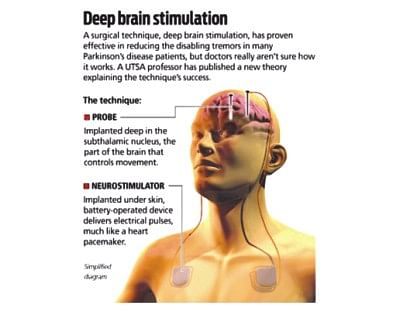Pacemaker for Parkinson’s: New hope for the helpless

Most of us probably know about a pacemaker for heart that is installed into human body to maintain normal heart rate and rhythm. Like this, pacemaker has been emerging as a promising treatment for a brain disease called Parkinson's disease, a condition where people have tremor in hands, develop slowness, rigidity and difficulty in movement. This option with a pacemaker can provide remarkable relief to patients when medicine had very little benefit.
Parkinson's disease, which is named after an English doctor James Parkinson most often develops after age 50. It is one of the most common brain disorders of the elderly that can limit a person's working capability and leads to injury from fall.
Parkinson's disease occurs when the brain cells that make dopamine (A chemical help control muscle movement) are slowly destroyed. This leads to the loss of muscle function. Modern treatments are effective at managing the early symptoms of the disease, mainly through the use of medicine. The damage gets worse with time and hence the dose of medicine and addition of new medicine are required by and by.
In many instances, as the disease progressed, medicine does not work well and also produce unwanted side effects that further complicate the disease. In this circumstance, a pacemaker that provides electrical impulses to specific parts of the brain to control abnormal rigid movement of the disease can make a significant improvement.
The procedure called Deep Brain Stimulation (DBS) surgery involves computer-guided placement of two electrodes into the brain that are connected to a pacemaker placed just below the collarbone on the left side. The similar treatment can also be applied in spinal cord to treat chronic back pain, epilepsy etc.
"With the advancement of technology, brain pacemaker for Parkinson's disease has been modernised with ultra thin electrode connected to pacemaker and rechargeable battery. The surgical complications have also reduced dramatically. The disease is no longer a crippling one. More patients are returning back to their working life with full capacity after the surgery", said eminent neurosurgeon from India Dr Sujoy Sanyal who came for a short visit in Bangladesh recently.
Dr Sanyal who mainly works at Rabindranath Tagore Hospital, Kolkata, cautioned that patient should be evaluated beforehand the operation by an experienced surgeon to look for the benefit of the surgery, as all patients are not suitable candidate like those having dementia or other contraindications of brain surgery.
He stated that the surgery is getting popularity and more patients are interested to go back to a functional life; they want a radical relief from crippling Parkinson's.
E-mail: [email protected]

 For all latest news, follow The Daily Star's Google News channel.
For all latest news, follow The Daily Star's Google News channel. 



Comments